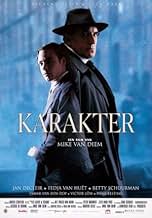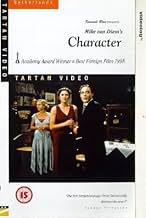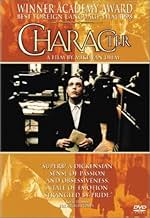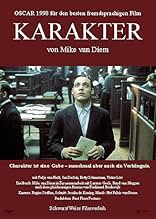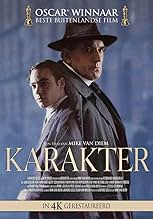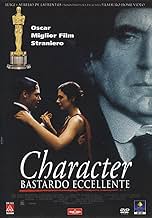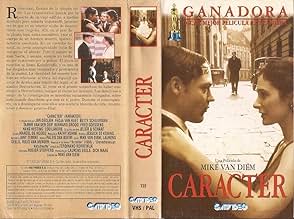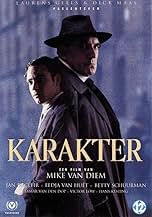Karakter
- 1997
- Tous publics
- 2h 2min
NOTE IMDb
7,7/10
12 k
MA NOTE
Ajouter une intrigue dans votre langueJacob Katadreuffe lives mute with his mother, has no contact with his father who only works against him and wants to become a lawyer, at all costs.Jacob Katadreuffe lives mute with his mother, has no contact with his father who only works against him and wants to become a lawyer, at all costs.Jacob Katadreuffe lives mute with his mother, has no contact with his father who only works against him and wants to become a lawyer, at all costs.
- Réalisation
- Scénario
- Casting principal
- Récompensé par 1 Oscar
- 18 victoires et 7 nominations au total
Avis à la une
Character is one of the best period films I have ever seen, and the enormous quantity of very interesting aspects in it make it worth watching.
I saw this film with the natural curiosity that a best foreign film Academy Award arouses in many people, and I was really delighted and surprised (Altough, I must admit I had hoped Spain's Secrets of the Heart would win). The story is quite beautiful, and Mike van Diem created a very solid screen play based on well known Ferdinand Bordewijk's novel.
The film has some extraordinary moments; I must say that the one that impressed me most was the final scene of the film, a scene of great visual impact and also of an incredibly big narrative content; it is the scene that reveals the mystery behind the cruel A.B. Dreverhaven's behaviour.
The performances given out in this film are simply spectacular especially Jan Decleir's as Dreverhaven. I also think Betty Schuurman as Jacob's mother and Victor Löw as De Gankelaar are terrific. One more thing, the art design is beautiful; the image the film gives us of the 1930's Amsterdam is very powerful and very beautiful.
Not only is it a great film then, but it is a story that carries a lot of feelings, and will take you on quiet an emotional ride. I can only say this: enjoy it!
I saw this film with the natural curiosity that a best foreign film Academy Award arouses in many people, and I was really delighted and surprised (Altough, I must admit I had hoped Spain's Secrets of the Heart would win). The story is quite beautiful, and Mike van Diem created a very solid screen play based on well known Ferdinand Bordewijk's novel.
The film has some extraordinary moments; I must say that the one that impressed me most was the final scene of the film, a scene of great visual impact and also of an incredibly big narrative content; it is the scene that reveals the mystery behind the cruel A.B. Dreverhaven's behaviour.
The performances given out in this film are simply spectacular especially Jan Decleir's as Dreverhaven. I also think Betty Schuurman as Jacob's mother and Victor Löw as De Gankelaar are terrific. One more thing, the art design is beautiful; the image the film gives us of the 1930's Amsterdam is very powerful and very beautiful.
Not only is it a great film then, but it is a story that carries a lot of feelings, and will take you on quiet an emotional ride. I can only say this: enjoy it!
Karakter is quite stunning on several levels. The cinematography is gorgeous - without the use of any noticeable special effects or surrealistic dream sequences. The quality of the filming surpasses that of most movies.
One of the best things for me (as an American) about watching foreign films is not knowing who most of the actors are, and this makes it easier to completely accept them as the characters they play. The two leads were outstanding, and the supporting characters (particularly Betty Schuurman as Joba, and Nans Kesting as Jan Maan) were very effective.
I found the story to be engrossing and - more than anything, the pacing amazed me. A person accustomed to reading classic novels would probably appreciate the way this film unfolded. There is a desire to reach the end, but no hurry.
For sure, this film wouldn't interest everyone, but I rank it among my favorite films. It deserved to win the Academy Award for Best Picture last year: for the story, for the performances, for the direction ... it's rare that one finds a movie so well-put together.
One of the best things for me (as an American) about watching foreign films is not knowing who most of the actors are, and this makes it easier to completely accept them as the characters they play. The two leads were outstanding, and the supporting characters (particularly Betty Schuurman as Joba, and Nans Kesting as Jan Maan) were very effective.
I found the story to be engrossing and - more than anything, the pacing amazed me. A person accustomed to reading classic novels would probably appreciate the way this film unfolded. There is a desire to reach the end, but no hurry.
For sure, this film wouldn't interest everyone, but I rank it among my favorite films. It deserved to win the Academy Award for Best Picture last year: for the story, for the performances, for the direction ... it's rare that one finds a movie so well-put together.
How is it possible for a boy, whose parents are devoid of normal humanity, to grow up to be loved and respected? The film, Character, presents a credible demonstration. It has the darkness of Ingmar Bergman or Charles Dickens, is slow-moving, thoroughly engrossing and it left me emotionally drained, which always elicits a high rating from me.
Dreverhaven is apparently an evil man: a bailiff who is quite willing to evict people in a terrible storm. He embodies two Nietzschean concepts: 1.
the will to power (he entered into power struggles with anyone whom he felt he could dominate) and 2. that a life becomes better by becoming stronger through adversity (he did everything in his power to bring adversity to his son, believing that that would strengthen him--and in many ways it did). His internal struggle between the will to power over his son and his desire to strengthen him is the prime mover of the film; his son's reactions to that are the core. Dreverhaven is also totally fearless; the question arises whether it is caused by bravery or just being tired of life.
The film opens with his son, Jacob Katadreuffe (Fedja van Huêt), coming home, all bloody, only to be arrested as a suspect in the murder of Dreverhaven. He then tells the two interrogators a most amazing story. Since he is describing his own life, one might suspect that he is embellishing the story in his own favour but I believe that he was totally candid.
The story is too complex to dwell on but certain aspects must be mentioned. Jacob's mother, Joba (Betty Schuurman), was a servant to Dreverhaven. On one and only one occasion he may have raped her: it is not made clear if she resisted. As soon as she discovered that she was pregnant, she left him and tried to sever all ties. For a long time, however, Dreverhaven repeatedly proposed marriage and was refused. His motivation is ambiguous (propriety or affection) and Joba was apparently determined not to allow Dreverhaven to beat her in a power struggle.
Because of his Mother's silence, young Jacob believed that she did not like him and, being a pariah because he was illegitimate, he turned to books for solace. Through this he developed a love of learning and a willingness to work hard and he advanced rapidly in a law firm, winning the respect and admiration of most of his colleagues, especially De Gankelaar (Victor Löw), who hired him. De Gankelaar, a man with a huge underbite and a heart to match, became Jacob's mentor, adviser and protector.
Denied access to his son, Dreverhaven began a game of terror against Jacob through legal channels.
The film is a study of character and characters. Their motivations are subtly hidden by consistent and superb acting. In my attempts to understand this dysfunctional family (if it can be called a family) I was forced to think. The slow movement allowed time for that. I want to see the film again, expecting that each viewing will bring a closer understanding. Even the evil Dreverhaven was more an object of pity rather than despicable; his actions were caused more by ignorance of human sensitivities, a dogmatic respect for the law and an unusual philosophy rather than by malice. The film is open-ended. What will Jacob do with the rest of his life?
Dreverhaven is apparently an evil man: a bailiff who is quite willing to evict people in a terrible storm. He embodies two Nietzschean concepts: 1.
the will to power (he entered into power struggles with anyone whom he felt he could dominate) and 2. that a life becomes better by becoming stronger through adversity (he did everything in his power to bring adversity to his son, believing that that would strengthen him--and in many ways it did). His internal struggle between the will to power over his son and his desire to strengthen him is the prime mover of the film; his son's reactions to that are the core. Dreverhaven is also totally fearless; the question arises whether it is caused by bravery or just being tired of life.
The film opens with his son, Jacob Katadreuffe (Fedja van Huêt), coming home, all bloody, only to be arrested as a suspect in the murder of Dreverhaven. He then tells the two interrogators a most amazing story. Since he is describing his own life, one might suspect that he is embellishing the story in his own favour but I believe that he was totally candid.
The story is too complex to dwell on but certain aspects must be mentioned. Jacob's mother, Joba (Betty Schuurman), was a servant to Dreverhaven. On one and only one occasion he may have raped her: it is not made clear if she resisted. As soon as she discovered that she was pregnant, she left him and tried to sever all ties. For a long time, however, Dreverhaven repeatedly proposed marriage and was refused. His motivation is ambiguous (propriety or affection) and Joba was apparently determined not to allow Dreverhaven to beat her in a power struggle.
Because of his Mother's silence, young Jacob believed that she did not like him and, being a pariah because he was illegitimate, he turned to books for solace. Through this he developed a love of learning and a willingness to work hard and he advanced rapidly in a law firm, winning the respect and admiration of most of his colleagues, especially De Gankelaar (Victor Löw), who hired him. De Gankelaar, a man with a huge underbite and a heart to match, became Jacob's mentor, adviser and protector.
Denied access to his son, Dreverhaven began a game of terror against Jacob through legal channels.
The film is a study of character and characters. Their motivations are subtly hidden by consistent and superb acting. In my attempts to understand this dysfunctional family (if it can be called a family) I was forced to think. The slow movement allowed time for that. I want to see the film again, expecting that each viewing will bring a closer understanding. Even the evil Dreverhaven was more an object of pity rather than despicable; his actions were caused more by ignorance of human sensitivities, a dogmatic respect for the law and an unusual philosophy rather than by malice. The film is open-ended. What will Jacob do with the rest of his life?
In the 20's, in Netherlands, Jacob Willem Katadreuffe (Fedja van Huêt) has just concluded the law school and has an argument with the High Court Enforcement Officer Dreverhaven (Jan Decleir) at his office. Katadreuffe leaves the place covered in blood. On the next morning, he is arrested by the police for the murder of Dreverhaven. He claims that he is innocent and discloses the story of his life to the Chief of Police.
His mother Joba (Betty Schuurman) was the maid at Dreverhaven. One night, she is raped by him and a couple of weeks later she learns that she is pregnant. Dreverhaven proposes to marry her but Joba quits her job and leaves his house. Along the years, Katadreuffe is bullied at school and called bastard by his mates and his mother never talks to him. One day, he is involved by other kids in a theft of bread and arrested by the police. When he calls his biological father to help him, Dreverhaven tells the police that he does not know who Katadreuffe is. The boy is intelligent and learns English reading a superseded and incomplete edition of encyclopedia that was left behind by the previous tenants of his apartment. Katadreuffe is also ambitious and asks for a job in a law office, where he becomes the protégé of his mentor De Gankelaar (Victor Löw). Soon he falls in unrequited love with the secretary Lorna Te George Victor (Tamar van den Dop). Along the years, Dreverhaven uses his power to harm him. When he concluded his course, he decides to pay a visit to Dreverhaven to tell him that he has wined their dispute. May Katadreuffe have killed Dreverhaven?
"Karakter" is a dark film about a young man needy of fatherly love. The intercourse between his parents is never clear whether it was a rape, as per the trailer, or consensual sex. In the view of Katadreuffe, his mother has always been "mute". But maybe it could be a trauma for her only intercourse since she is a stubborn woman. Dreverhaven is a mysterious and ambiguous character. Is he only cruel or is he trying to harden his son to face the challenges of the brutal society where they live and be a winner? The screenplay is very well-written and keeps the attention of the viewer until the last scene. The cinematography, set decoration and art direction are perfect and bring the viewer to Netherlands in the middle 20's. The cast has magnificent performance highlighting Jan Decleir. My vote is eight.
Title (Brazil): "Caráter" ("Character")
His mother Joba (Betty Schuurman) was the maid at Dreverhaven. One night, she is raped by him and a couple of weeks later she learns that she is pregnant. Dreverhaven proposes to marry her but Joba quits her job and leaves his house. Along the years, Katadreuffe is bullied at school and called bastard by his mates and his mother never talks to him. One day, he is involved by other kids in a theft of bread and arrested by the police. When he calls his biological father to help him, Dreverhaven tells the police that he does not know who Katadreuffe is. The boy is intelligent and learns English reading a superseded and incomplete edition of encyclopedia that was left behind by the previous tenants of his apartment. Katadreuffe is also ambitious and asks for a job in a law office, where he becomes the protégé of his mentor De Gankelaar (Victor Löw). Soon he falls in unrequited love with the secretary Lorna Te George Victor (Tamar van den Dop). Along the years, Dreverhaven uses his power to harm him. When he concluded his course, he decides to pay a visit to Dreverhaven to tell him that he has wined their dispute. May Katadreuffe have killed Dreverhaven?
"Karakter" is a dark film about a young man needy of fatherly love. The intercourse between his parents is never clear whether it was a rape, as per the trailer, or consensual sex. In the view of Katadreuffe, his mother has always been "mute". But maybe it could be a trauma for her only intercourse since she is a stubborn woman. Dreverhaven is a mysterious and ambiguous character. Is he only cruel or is he trying to harden his son to face the challenges of the brutal society where they live and be a winner? The screenplay is very well-written and keeps the attention of the viewer until the last scene. The cinematography, set decoration and art direction are perfect and bring the viewer to Netherlands in the middle 20's. The cast has magnificent performance highlighting Jan Decleir. My vote is eight.
Title (Brazil): "Caráter" ("Character")
is a real shame that this kind of movies have to be discovered 3 or 4 years since the release (most dont find their way to theaters) i know that people in the entertainment business are in just for the sake of money, but if they dont want to invest in producing quality movies (books,music etc) at least have to be more open in let these great movies have a decent distribution in the states.
Le saviez-vous
- AnecdotesAlthough the story takes place in the Dutch city of Rotterdam, many scenes were filmed in other cities across The Netherlands and Europe. This was because Rotterdam has very few buildings from this era left following heavy bombing during the Second World War. Filming locations included: Hamburg (Germany), Wroclaw (Poland), Antwerp and Ghent (Belgium) and The Hague (The Netherlands).
- GaffesIn one of the street scenes, you can see an extra in modern outfit and with no headwear on.
- Citations
Joba: Why don't you leave our boy in peace?
Dreverhaven: I'll strangle him for nine-tenths, and the last tenth will make him strong.
Meilleurs choix
Connectez-vous pour évaluer et suivre la liste de favoris afin de recevoir des recommandations personnalisées
- How long is Character?Alimenté par Alexa
Détails
- Date de sortie
- Pays d’origine
- Site officiel
- Langues
- Aussi connu sous le nom de
- Character
- Lieux de tournage
- Wroclaw, Dolnoslaskie, Pologne(Miernicza 27, Wroclaw, Dolnoslaskie, Poland)
- Sociétés de production
- Voir plus de crédits d'entreprise sur IMDbPro
Box-office
- Budget
- 4 500 000 $US (estimé)
- Montant brut aux États-Unis et au Canada
- 623 983 $US
- Week-end de sortie aux États-Unis et au Canada
- 37 268 $US
- 29 mars 1998
- Montant brut mondial
- 623 983 $US
- Durée
- 2h 2min(122 min)
- Couleur
- Mixage
- Rapport de forme
- 1.85 : 1
Contribuer à cette page
Suggérer une modification ou ajouter du contenu manquant


